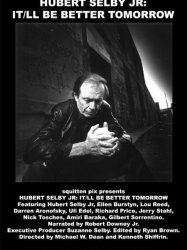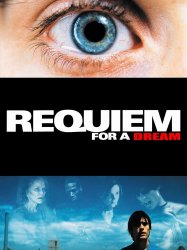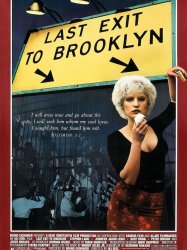Hubert Selby, Jr. is a Actor and Novel American born on 23 july 1928 at Brooklyn (USA)

Hubert "Cubby" Selby, Jr. (July 23, 1928 – April 26, 2004) was a 20th-century American writer. His best-known novels are Last Exit to Brooklyn (1964) and Requiem for a Dream (1978), exploring worlds in the New York area. Both novels were adapted later as films, and he appeared in small roles in each.
Selby wrote about a harsh underworld seldom portrayed in literature before then: his first novel was prosecuted for obscenity in Great Britain in 1967, and banned in Italy. His work was defended by leading writers. He has been considered highly influential to more than a generation of writers. In addition to his works, for 20 years, he taught creative writing at the University of Southern California in Los Angeles, where he lived full-time since 1983.
Hubert Selby was born in 1928 in Brooklyn, New York City, to Adalin and Hubert Selby Sr., a merchant seaman and former coal miner from Kentucky. Selby and his wife Adalin had settled in Bay Ridge. The boy attended public schools, including the competitive Stuyvesant High School. A lifelong fan of the Chicago Cubs, his childhood nickname, "Cubby", accompanied him through life.
Selby Jr. dropped out of school, and at the age of 15, persuaded recruiters to let him join the Merchant Marines. (His father had recently rejoined it.) In 1947, while at sea, Selby Jr. was diagnosed with advanced tuberculosis; doctors predicted that he would live less than a year.
He was taken off the ship in Bremen, Germany, and sent back to the United States. For the next three and a half years, Selby was in and out of the Marine Hospital in New York for treatment. Antibiotics had not been available and TB was widespread.
Selby went through an experimental drug treatment, streptomycin, that later caused some severe complications. During an operation, surgeons removed several of Selby's ribs in order to reach his lungs. One of his lungs collapsed, and doctors removed part of the other. While the surgery saved Selby's life, he had a year-long recuperation and chronic pulmonary problems for the rest of his life. Selby was given painkillers and heroin because of the severity of the surgery, and he became addicted. He struggled with substance abuse for decades.
Becoming a writer
With no qualifications, no work experience aside from the Merchant Marine, and his poor health, Selby had trouble finding a job. He had married and he and his wife, nicknamed Tiny, had a daughter, Claudia. He raised their daughter while his wife worked in a department store.
For the next ten years, Selby was mostly bedridden; he was frequently hospitalized with a variety of lung-related ailments. The doctors offered a bleak prognosis, suggesting he was unlikely to survive long because he "just didn't have enough lung capacity". Gilbert Sorrentino, a childhood friend who had become a writer encouraged Selby to write fiction. Unable to have regular work because of his health, Selby decided, "I know the alphabet. Maybe I could be a writer."
He later wrote:
I was sitting at home and had a profound experience. I experienced, in all of my Being, that someday I was going to die, and it wouldn't be like it had been happening, almost dying but somehow staying alive, but I would just die! And two things would happen right before I died: I would regret my entire life; I would want to live it over again. This terrified me. The thought that I would live my entire life, look at it and realize I blew it forced me to do something with my life.
With no formal training, Selby used a raw language to portray the bleak and violent world that was part of his youth. He has said, "I write, in part, by ear. I hear, as well as feel and see, what I am writing. I have always been enamoured with the music of the speech in New York."
Little concerned with proper grammar, punctuation, or diction, Selby used unorthodox techniques in most of his works. He indented his paragraphs with alternating lengths, often by simply dropping down one line when finished with a paragraph. Like Jack Kerouac in his "spontaneous prose", Selby often completed his writing in a fast, stream-of-consciousness style. He replaced apostrophes with forward slashes "/," which were closer on the typewriter, to avoid interrupting his flow of writing. He did not use quotation marks. He might present a dialogue as a complete paragraph, with no denotion among alternating speakers. His prose was stripped down, bare and blunt.
Aspects of his experiences with longshoremen, the homeless, thugs, pimps, transvestites, prostitutes, homosexuals, addicts and the overall poverty-stricken community, is expressed in Last Exit to Brooklyn.
Early works
Selby started working on his first short story, "The Queen Is Dead", in 1958. At the time, he had a succession of day jobs, but he wrote every night. During the day, he worked as a secretary, a gas station attendant, and a freelance copywriter. The short story developed slowly for the next six years before he published it.
In 1961, his short story "Tralala" was published in the literary journal, The Provincetown Review. It also appeared in Black Mountain Review and New Directions. His unstructured style and coarse descriptions supported his portrayal of the seedy life (ridden with violence, theft and mediocre con-artistry) and the gang rape of a prostitute. A number of critics attacked the subjects and harshness of the story. The journal editor was arrested for selling pornographic literature to a minor. The journal was used as evidence in an obscenity trial, but the case was later dismissed on appeal.
As Selby continued to write, his longtime friend Amiri Baraka, the playwright, encouraged him to contact Sterling Lord, then Kerouac's agent. Selby combined "Tralala", "The Queen Is Dead" and four other loosely linked short stories as part of his first novel, Last Exit to Brooklyn (1964). The novel was accepted and published by Grove Press, which had already published works by William S. Burroughs.
The novel was praised by many, including the poet Allen Ginsberg, who predicted that it would "explode like a rusty hellish bombshell over America and still be eagerly read in a hundred years." But, at a time when literature excluded much that was harsh, not everyone wanted to read his detailed depictions of homosexuality and drug addiction, as well as gang rape and other forms of human brutality and cruelty. In 1967, the novel was prosecuted for obscenity in Great Britain. The notable British writer Anthony Burgess was among a number of writers who appeared as witnesses in its defense. The all-male jury's conviction was later reversed on appeal. The novel was banned in Italy. (For more details on the British trial of Last Exit to Brooklyn, see the entry Last Exit to Brooklyn Trial.)
In 1967, Selby moved from Brooklyn to Los Angeles to try to escape his addictions. That year, Selby met his future wife, Suzanne, at a bar in West Hollywood. The couple moved in together two days after they met. They married in 1969. For the next decade, they traveled back and forth between their home in Southern California and the East Coast, settling permanently in the Los Angeles area in 1983.
Although he wrote all his work while sober, Selby continued to battle drug addiction. In 1967 he was picked up for heroin possession and served two months in the Los Angeles County jail. After his release, he finally kicked the habit. He stayed clean of drugs and alcohol until his death. He refused morphine on his deathbed, although he was in pain.
Life after Last Exit to Brooklyn
In 1971, Selby published his second novel, The Room, which received positive reviews. It featured a criminally insane man, locked in a room in a prison, who reminisces about his disturbing past. Selby described The Room as "the most disturbing book ever written." He said he could not read it for decades after writing it.
Selby continued to write short fiction, as well as screenplays and teleplays at his apartment in West Hollywood. His work was published in many magazines, including Black Mountain Review, Evergreen Review, Provincetown Review, Kulchur, New Directions Annual, Yugen, Swank and Open City.
For the last 20 years of his life, Selby also taught creative writing as an adjunct professor in the Master of Professional Writing program at the University of Southern California. Selby wryly noted that The New York Times would not review his books when they were published, but he predicted they would publish his obituary.
A film adaptation of Last Exit to Brooklyn, directed by Uli Edel, was made in 1989. Selby appeared in Brooklyn in a brief cameo as a taxi driver.
Requiem for a Dream (1978) was adapted as a film of the same name released in 2000. He had a small role as a prison guard. Ellen Burstyn was nominated for an Academy Award as Best Actress for her role in Dream.
In the 1980s, Selby met the punk rock singer Henry Rollins, who had long admired the writer's works and publicly championed them. Rollins helped broaden Selby's readership, and also arranged recording sessions and reading tours for Selby. Rollins issued original recordings through his own 2.13.61 publications, and distributed Selby's other works.
Selby was also the subject of the 2005 documentary, Hubert Selby Jr: It/ll Be Better Tomorrow
He suffered from depression, which intensified toward the end of his life.
The last month of his life, Selby spent in and out of the hospital and died in Highland Park, Los Angeles, on April 26, 2004 of chronic obstructive pulmonary disease. The New York Times published his obituary the next day.
Source : Wikidata
Hubert Selby, Jr.

- Infos
- Photos
- Best films
- Family
- Characters
- Awards
Birth name Hubert Selby, Jr.
Nationality USA
Birth 23 july 1928 at Brooklyn (USA)
Death 26 april 2004 (at 75 years) at Los Angeles (USA)
Nationality USA
Birth 23 july 1928 at Brooklyn (USA)
Death 26 april 2004 (at 75 years) at Los Angeles (USA)
Hubert "Cubby" Selby, Jr. (July 23, 1928 – April 26, 2004) was a 20th-century American writer. His best-known novels are Last Exit to Brooklyn (1964) and Requiem for a Dream (1978), exploring worlds in the New York area. Both novels were adapted later as films, and he appeared in small roles in each.
Selby wrote about a harsh underworld seldom portrayed in literature before then: his first novel was prosecuted for obscenity in Great Britain in 1967, and banned in Italy. His work was defended by leading writers. He has been considered highly influential to more than a generation of writers. In addition to his works, for 20 years, he taught creative writing at the University of Southern California in Los Angeles, where he lived full-time since 1983.
Biography
Early life and educationHubert Selby was born in 1928 in Brooklyn, New York City, to Adalin and Hubert Selby Sr., a merchant seaman and former coal miner from Kentucky. Selby and his wife Adalin had settled in Bay Ridge. The boy attended public schools, including the competitive Stuyvesant High School. A lifelong fan of the Chicago Cubs, his childhood nickname, "Cubby", accompanied him through life.
Selby Jr. dropped out of school, and at the age of 15, persuaded recruiters to let him join the Merchant Marines. (His father had recently rejoined it.) In 1947, while at sea, Selby Jr. was diagnosed with advanced tuberculosis; doctors predicted that he would live less than a year.
He was taken off the ship in Bremen, Germany, and sent back to the United States. For the next three and a half years, Selby was in and out of the Marine Hospital in New York for treatment. Antibiotics had not been available and TB was widespread.
Selby went through an experimental drug treatment, streptomycin, that later caused some severe complications. During an operation, surgeons removed several of Selby's ribs in order to reach his lungs. One of his lungs collapsed, and doctors removed part of the other. While the surgery saved Selby's life, he had a year-long recuperation and chronic pulmonary problems for the rest of his life. Selby was given painkillers and heroin because of the severity of the surgery, and he became addicted. He struggled with substance abuse for decades.
Becoming a writer
With no qualifications, no work experience aside from the Merchant Marine, and his poor health, Selby had trouble finding a job. He had married and he and his wife, nicknamed Tiny, had a daughter, Claudia. He raised their daughter while his wife worked in a department store.
For the next ten years, Selby was mostly bedridden; he was frequently hospitalized with a variety of lung-related ailments. The doctors offered a bleak prognosis, suggesting he was unlikely to survive long because he "just didn't have enough lung capacity". Gilbert Sorrentino, a childhood friend who had become a writer encouraged Selby to write fiction. Unable to have regular work because of his health, Selby decided, "I know the alphabet. Maybe I could be a writer."
He later wrote:
I was sitting at home and had a profound experience. I experienced, in all of my Being, that someday I was going to die, and it wouldn't be like it had been happening, almost dying but somehow staying alive, but I would just die! And two things would happen right before I died: I would regret my entire life; I would want to live it over again. This terrified me. The thought that I would live my entire life, look at it and realize I blew it forced me to do something with my life.
With no formal training, Selby used a raw language to portray the bleak and violent world that was part of his youth. He has said, "I write, in part, by ear. I hear, as well as feel and see, what I am writing. I have always been enamoured with the music of the speech in New York."
Little concerned with proper grammar, punctuation, or diction, Selby used unorthodox techniques in most of his works. He indented his paragraphs with alternating lengths, often by simply dropping down one line when finished with a paragraph. Like Jack Kerouac in his "spontaneous prose", Selby often completed his writing in a fast, stream-of-consciousness style. He replaced apostrophes with forward slashes "/," which were closer on the typewriter, to avoid interrupting his flow of writing. He did not use quotation marks. He might present a dialogue as a complete paragraph, with no denotion among alternating speakers. His prose was stripped down, bare and blunt.
Aspects of his experiences with longshoremen, the homeless, thugs, pimps, transvestites, prostitutes, homosexuals, addicts and the overall poverty-stricken community, is expressed in Last Exit to Brooklyn.
Early works
Selby started working on his first short story, "The Queen Is Dead", in 1958. At the time, he had a succession of day jobs, but he wrote every night. During the day, he worked as a secretary, a gas station attendant, and a freelance copywriter. The short story developed slowly for the next six years before he published it.
In 1961, his short story "Tralala" was published in the literary journal, The Provincetown Review. It also appeared in Black Mountain Review and New Directions. His unstructured style and coarse descriptions supported his portrayal of the seedy life (ridden with violence, theft and mediocre con-artistry) and the gang rape of a prostitute. A number of critics attacked the subjects and harshness of the story. The journal editor was arrested for selling pornographic literature to a minor. The journal was used as evidence in an obscenity trial, but the case was later dismissed on appeal.
As Selby continued to write, his longtime friend Amiri Baraka, the playwright, encouraged him to contact Sterling Lord, then Kerouac's agent. Selby combined "Tralala", "The Queen Is Dead" and four other loosely linked short stories as part of his first novel, Last Exit to Brooklyn (1964). The novel was accepted and published by Grove Press, which had already published works by William S. Burroughs.
The novel was praised by many, including the poet Allen Ginsberg, who predicted that it would "explode like a rusty hellish bombshell over America and still be eagerly read in a hundred years." But, at a time when literature excluded much that was harsh, not everyone wanted to read his detailed depictions of homosexuality and drug addiction, as well as gang rape and other forms of human brutality and cruelty. In 1967, the novel was prosecuted for obscenity in Great Britain. The notable British writer Anthony Burgess was among a number of writers who appeared as witnesses in its defense. The all-male jury's conviction was later reversed on appeal. The novel was banned in Italy. (For more details on the British trial of Last Exit to Brooklyn, see the entry Last Exit to Brooklyn Trial.)
In 1967, Selby moved from Brooklyn to Los Angeles to try to escape his addictions. That year, Selby met his future wife, Suzanne, at a bar in West Hollywood. The couple moved in together two days after they met. They married in 1969. For the next decade, they traveled back and forth between their home in Southern California and the East Coast, settling permanently in the Los Angeles area in 1983.
Although he wrote all his work while sober, Selby continued to battle drug addiction. In 1967 he was picked up for heroin possession and served two months in the Los Angeles County jail. After his release, he finally kicked the habit. He stayed clean of drugs and alcohol until his death. He refused morphine on his deathbed, although he was in pain.
Life after Last Exit to Brooklyn
In 1971, Selby published his second novel, The Room, which received positive reviews. It featured a criminally insane man, locked in a room in a prison, who reminisces about his disturbing past. Selby described The Room as "the most disturbing book ever written." He said he could not read it for decades after writing it.
Selby continued to write short fiction, as well as screenplays and teleplays at his apartment in West Hollywood. His work was published in many magazines, including Black Mountain Review, Evergreen Review, Provincetown Review, Kulchur, New Directions Annual, Yugen, Swank and Open City.
For the last 20 years of his life, Selby also taught creative writing as an adjunct professor in the Master of Professional Writing program at the University of Southern California. Selby wryly noted that The New York Times would not review his books when they were published, but he predicted they would publish his obituary.
A film adaptation of Last Exit to Brooklyn, directed by Uli Edel, was made in 1989. Selby appeared in Brooklyn in a brief cameo as a taxi driver.
Requiem for a Dream (1978) was adapted as a film of the same name released in 2000. He had a small role as a prison guard. Ellen Burstyn was nominated for an Academy Award as Best Actress for her role in Dream.
In the 1980s, Selby met the punk rock singer Henry Rollins, who had long admired the writer's works and publicly championed them. Rollins helped broaden Selby's readership, and also arranged recording sessions and reading tours for Selby. Rollins issued original recordings through his own 2.13.61 publications, and distributed Selby's other works.
Selby was also the subject of the 2005 documentary, Hubert Selby Jr: It/ll Be Better Tomorrow
He suffered from depression, which intensified toward the end of his life.
The last month of his life, Selby spent in and out of the hospital and died in Highland Park, Los Angeles, on April 26, 2004 of chronic obstructive pulmonary disease. The New York Times published his obituary the next day.
Best films
Usually with
Filmography of Hubert Selby, Jr. (4 films)
Actor
 , 1h19
, 1h19Origin USA
Genres Documentary
Themes Films about writers, Documentaire sur une personnalité
Actors Hubert Selby, Jr., Henry Rollins, Lou Reed, Jared Leto, James Remar, Darren Aronofsky
Roles Self
Rating73%






Requiem for a Dream (2000)
, 1h50Directed by Darren Aronofsky
Origin USA
Genres Drama, Thriller, Horror, Crime
Themes Medical-themed films, Films about drugs, Films about sexuality, Films about television, Erotic films, LGBT-related films, Films about prostitution, Films about psychiatry, Films set in psychiatric hospitals, LGBT-related film, Lesbian-related films
Actors Ellen Burstyn, Jared Leto, Jennifer Connelly, Marlon Wayans, Christopher McDonald, Louise Lasser
Roles Laughing Guard
Rating82%





During the summer in Brighton Beach, Brooklyn, elderly widow Sara Goldfarb (Ellen Burstyn) constantly watches television, particularly infomercials hosted by Tappy Tibbons (Christopher McDonald). After receiving an unexpected phone call that she has won a spot to participate on a television game show, she becomes obsessed with regaining the youthful appearance she possesses in an old photograph from her son Harry's (Jared Leto) graduation many years earlier. In order to fit into her old red dress seen in the picture, the favorite one of her deceased husband Seymour, she goes on a crash diet. In order to reach her goal sooner, she goes to a doctor to discuss weight loss. The doctor gives her a prescription for weight-loss amphetamine pills throughout the day and a sedative at night. Harry warns her about amphetamine dependence and risk of life-threatening consequences, but she rebuffs him and insists that the chance to be on television has given her a reason to live. As the months go by, Sara's tolerance for the pills adjust and as a result she is no longer able to feel the same high the pills once gave her. When her invitation has still not arrived, she wrongfully increases her dosage from double to triple and, as a result, begins to suffer from amphetamine psychosis. Soon, her delusions worsen and she is driven to the brink of madness when she suffers a hallucination that she appears on the game show as the principal subject while being attacked by her monstrous, anthropomorphized refrigerator.

Last Exit to Brooklyn (1990)
, 1h42Directed by Uli Edel
Origin German
Genres Drama
Themes Films about sexuality, Films about the labor movement, Erotic films, LGBT-related films, Films about prostitution, Transgender in film, Political films, LGBT-related films, LGBT-related film
Actors Stephen Lang, Jennifer Jason Leigh, Burt Young, Peter Dobson, Jerry Orbach, Stephen Baldwin
Roles Car Driver
Rating67%





A group of prostitutes, union workers, and drag queens all lead difficult lives within an existence of drugs, crime and violence in a working class Brooklyn neighborhood.
Scriptwriter
 , 1h19
, 1h19Origin USA
Genres Documentary
Themes Films about writers, Documentaire sur une personnalité
Actors Hubert Selby, Jr., Henry Rollins, Lou Reed, Jared Leto, James Remar, Darren Aronofsky
Roles Writer
Rating73%






Fear X (2003)
, 1h31Directed by Nicolas Winding Refn
Origin Danemark
Genres Thriller, Horror
Actors John Turturro, James Remar, Deborah Kara Unger, William Allen Young, Gene Davis, Nadia Litz
Roles Writer
Rating59%





A security guard's wife is killed in a seemingly random incident. Prompted by mysterious visions, he journeys to discover the true circumstances surrounding her murder.

Requiem for a Dream (2000)
, 1h50Directed by Darren Aronofsky
Origin USA
Genres Drama, Thriller, Horror, Crime
Themes Medical-themed films, Films about drugs, Films about sexuality, Films about television, Erotic films, LGBT-related films, Films about prostitution, Films about psychiatry, Films set in psychiatric hospitals, LGBT-related film, Lesbian-related films
Actors Ellen Burstyn, Jared Leto, Jennifer Connelly, Marlon Wayans, Christopher McDonald, Louise Lasser
Roles Novel
Rating82%





During the summer in Brighton Beach, Brooklyn, elderly widow Sara Goldfarb (Ellen Burstyn) constantly watches television, particularly infomercials hosted by Tappy Tibbons (Christopher McDonald). After receiving an unexpected phone call that she has won a spot to participate on a television game show, she becomes obsessed with regaining the youthful appearance she possesses in an old photograph from her son Harry's (Jared Leto) graduation many years earlier. In order to fit into her old red dress seen in the picture, the favorite one of her deceased husband Seymour, she goes on a crash diet. In order to reach her goal sooner, she goes to a doctor to discuss weight loss. The doctor gives her a prescription for weight-loss amphetamine pills throughout the day and a sedative at night. Harry warns her about amphetamine dependence and risk of life-threatening consequences, but she rebuffs him and insists that the chance to be on television has given her a reason to live. As the months go by, Sara's tolerance for the pills adjust and as a result she is no longer able to feel the same high the pills once gave her. When her invitation has still not arrived, she wrongfully increases her dosage from double to triple and, as a result, begins to suffer from amphetamine psychosis. Soon, her delusions worsen and she is driven to the brink of madness when she suffers a hallucination that she appears on the game show as the principal subject while being attacked by her monstrous, anthropomorphized refrigerator.

Last Exit to Brooklyn (1990)
, 1h42Directed by Uli Edel
Origin German
Genres Drama
Themes Films about sexuality, Films about the labor movement, Erotic films, LGBT-related films, Films about prostitution, Transgender in film, Political films, LGBT-related films, LGBT-related film
Actors Stephen Lang, Jennifer Jason Leigh, Burt Young, Peter Dobson, Jerry Orbach, Stephen Baldwin
Roles Novel
Rating67%





A group of prostitutes, union workers, and drag queens all lead difficult lives within an existence of drugs, crime and violence in a working class Brooklyn neighborhood.
 Connection
Connection




